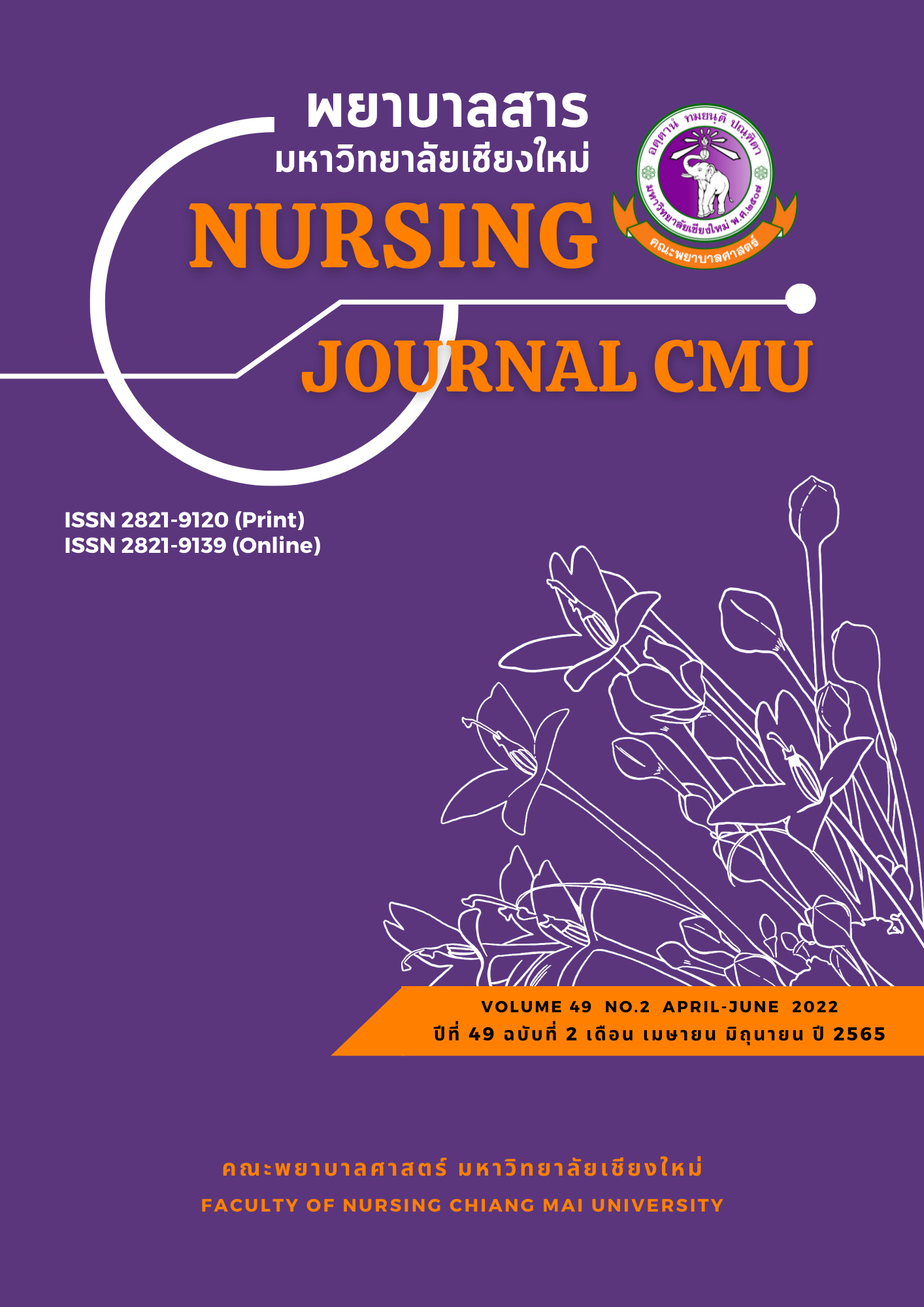ปัจจัยที่เกี่ยวข้องกับการจัดการครอบครัวในครอบครัวที่มีบุตรโรคหัวใจพิการแต่กำเนิด
คำสำคัญ:
การจัดการครอบครัว, เด็กโรคหัวใจพิการแต่กำเนิดบทคัดย่อ
การจัดการครอบครัวที่เหมาะสมในครอบครัวที่มีบุตรโรคหัวใจพิการแต่กำเนิด มีความสำคัญเพราะช่วยให้บุตรได้รับการดูแลที่เหมาะสม และสามารถรับการรักษาด้วยวิธีการผ่าตัดตามแผนการรักษา การวิจัยเชิงพรรณนาแบบหาความสัมพันธ์ครั้งนี้ มีวัตถุประสงค์เพื่อศึกษาปัจจัยที่เกี่ยวข้องกับการจัดการครอบครัวในครอบครัวที่มีบุตรโรคหัวใจพิการแต่กำเนิด คัดเลือกกลุ่มตัวอย่างแบบเฉพาะเจาะจง คือ บิดาหรือมารดาที่มีบุตรโรคหัวใจพิการแต่กำเนิดชนิดไม่มีอาการเขียวโดยเด็กมีอายุ 1 ถึง 3 ปี ที่มาติดตามรักษาที่คลินิกโรคหัวใจ แผนกผู้ป่วยนอก โรงพยาบาลระดับทุติยภูมิ จำนวน 85 ราย เครื่องมือที่ใช้รวบรวมข้อมูล ประกอบด้วย แบบบันทึกข้อมูลส่วนบุคคลของครอบครัวและเด็ก แบบสอบถามการสนับสนุนทางสังคม และแบบสอบถามการจัดการครอบครัว เครื่องมือผ่านการทดสอบคุณภาพด้านความตรงตามเนื้อหาและความเชื่อมั่น วิเคราะห์ข้อมูลโดยใช้สถิติพรรณนา สถิติ Eta coefficient และ Pearson’s correlation coefficient
ผลการศึกษาพบว่า
- คะแนนการจัดการครอบครัวในครอบครัวที่มีบุตรโรคหัวใจพิการแต่กำเนิดโดยรวมอยู่ในระดับปานกลาง มีคะแนนเฉลี่ยเท่ากับ 137.31 (SD = 7.67) คะแนนการจัดการครอบครัวรายด้านทุกด้านอยู่ในระดับปานกลาง
- ปัจจัยส่วนบุคคลของครอบครัว ประกอบด้วย ระดับการศึกษา มีความสัมพันธ์ทางบวกกับการจัดการครอบครัวด้านความสามารถในการจัดการดูแลสภาพความเจ็บป่วย (η=.555, p <.05) และมีความสัมพันธ์ทางบวกด้านความยากลำบากในชีวิตครอบครัว (η=.683, p <.05) รายได้มีความสัมพันธ์ทางบวกกับการจัดการครอบครัวด้านความยากลำบากในชีวิตครอบครัวอย่างมีนัยสำคัญทางสถิติ (η=.742, p <.05)
- ปัจจัยส่วนบุคคลของเด็ก ประกอบด้วย ระยะเวลาการเจ็บป่วยมีความสัมพันธ์ทางบวกกับการจัดการครอบครัวด้านความสามารถในการจัดการดูแลสภาพความเจ็บป่วย (η=.313, p <.05) และความถี่การเข้ารับการรักษาในโรงพยาบาลมีความสัมพันธ์ทางบวกกับการจัดการครอบครัวด้านชีวิตประจำวันของเด็ก (η= .336, p <.05)
- การสนับสนุนทางสังคมด้านข้อมูลข่าวสารมีความสัมพันธ์ทางลบกับการจัดการครอบครัวด้านมุมมองของผลกระทบของสภาพความเจ็บป่วย (r = -.224, p <.05) และการสนับสนุนทรัพยากรมีความสัมพันธ์ทางลบกับการจัดการครอบครัวด้านความยากลำบากในชีวิตครอบครัวอย่างมีนัยสำคัญทางสถิติ (r =-.226, p <.05)
ผลการวิจัยในครั้งนี้ บุคคลกรทางการพยาบาลสามารถนำข้อมูลที่ได้เป็นแนวทางในการส่งเสริมการจัดการครอบครัวในครอบครัวที่ดูแลเด็กโรคหัวใจพิการแต่กำเนิดให้มีความเหมาะสม เพื่อให้ครอบครัวมีการจัดการครอบครัวอย่างมีประสิทธิภาพต่อไป
เอกสารอ้างอิง
American Heart Association. (2015). Congenital heart disease. Retrieved From http://professional.heart.org/professional/Communities/CongenitalHeartDiseaseandPediatricCardiology/UCM_475296_Congenital-Heart-Disease-and-Pediatric-Cardiology.jsp
Barbosa, M. A. M., Chaud, M. N., & Gomes, M. M. F. (2008). Experiences of mothers of disabled children: A phenomenological study. Escola Paulista de Enfermagem, 21(1), 46-52. doi: 10.1590/ S0103-21002008000100007.
Burns, N., & Grove, S. K. (2005). The practice of nursing research conduct, critique, & utilization (5th ed.). Philadelphia: Elsevier saunders.
Chitayasothorn, D. (2009). Diana baumrind diana baumrind’s parenting styles. University of the Thai Chamber of Commerce Journal. 29(4), 173-187. (in Thai)
Hayeemasae, K. (2013). Comparative study on social support of caregivers of children with autism spectrum disorders and caregivers of typical development children in Songklanagarind hospital (Master’s thesis of Arts in Human and Social Development). Prince of Songkla University. (in Thai)
House, J. S. (1981). Work stress and social support. MA: Addison-Wesley.
Keawvichit, N., & Thajeen, K. ( 2007). Knowledge and the parental role in caring for children with heart disease. Songklanagarind Medical Journal. 25(4), 273-282. (in Thai)
Kim, I., Ekas, N. V., & Hock, R. (2016). Associations between child behavior problems, family management, and depressive symptoms for mothers of children with autism spectrum disorder. Research in Autism Spectrum Disorders, 26, 80-90. doi: 10.1016/j.rasd.2016.03.009
Knafl, K. A., Deatrick, J. A., & Havill, N. L. (2012). Continued development of the family management style framework. Journal of Family Nursing, 18(1), 11-34. doi: 10.1177/1074840711427294
Knafl, K. A., Deatrick, J. A., Knafl, G. J., Gallo, A. M., Grey, M., & Dixon, J. (2013). Patterns of family management of childhood chronic conditions and their relationship to child and family functioning. Journal of Pediatric Nursing, 28(6), 523-535.
Phromreungrit, K ., Jintrawet, U., & Chotibang, J. (2015). Caregiving and related factors among caregivers of children with congenital heart disease. Nursing Journal, 42(Supplement November), 35-45. (in Thai)
Phornphutkul, C. (2016). Care of children with heart disease. Retrieved from http://www.doctordek.com (in Thai)
Prateepchaikul, L. (2002). Nursing care for early childhood health. Songkhla: Faculty of Nursing Prince of Songkla University. (in Thai)
Prithviraj, D., Reddy, B., Rajeshwari, S., & Jain, U. (2017). Incidence of congenital heart disease among the neonates in neonatal intensive care unit of a tertiary care hospital: Pediatric review. International Journal of Pediatric Research, 4(4), 253-256
Polit, D. F. (2010). Statistic and data analysis for nursing research (2nd ed.). New Jersey: Pearson Education.
Ponvilawan, S. (2012). Cope with heart disease in children. Retrieved from https://www.bumrungrad.com/ betterhealth / 2555 / keep-your-heart-healthy / congenital- heart-defects. (in Thai)
Samruen, S. (2008). Factors influencing the management of families with children suffering from asthma. Master of Nursing Science, Family Medicine Nursing, (Master in thesis). Burapha University.
Sheng, N., Ma, J., Ding, W., & Zhang, Y. (2018). Family management affecting transition readiness and quality of life of Chinese children and young people with chronic diseases. Journal of Child Health Care, 2018, 1-16.
Smith, P. (2001). Primary care in children with congenital heart disease. Journal of Pediatric Nursing, 16(5), 308-319.
Songthip, S., Sanasuttipun, W., & Srichantaranit, A. (2015). The effects of supportive-educative nursing system program on knowledge and behaviors of mothers of children with acyanotic congenital heart disease aged 0-2 years. Thai Journal of Cardio-Thoracic Nursing. 26(2), 25-38. (in Thai)
Sukhpan, K. (2013). Congenital heart disease. In S. Lekawanvijit (Ed.), Pathology of Cardiovascular (p. 33.). Chiang Mai: Chiang Mai University. (in Thai)
Woodward, C. S. (2011). Keeping children with congenital heart disease healthy. Journal of Pediatric Health Care, 25(6), 373-378. doi.org/10.1016/j.pedhc.2011.03.007
Wright, G. E., & Rocchini, A. P. (2002). Primary and general care of the child with congenital heart disease. Access Current Journal Review, 11(2), 89-93. doi.org/10.1016/S1062-1458(02)00521-4
ดาวน์โหลด
เผยแพร่แล้ว
รูปแบบการอ้างอิง
ฉบับ
ประเภทบทความ
สัญญาอนุญาต
ลิขสิทธิ์ (c) 2022 พยาบาลสาร

อนุญาตภายใต้เงื่อนไข Creative Commons Attribution-NonCommercial-NoDerivatives 4.0 International License.
บทความที่ได้รับการตีพิมพ์เป็นลิขสิทธิ์ของวารสารพยาบาลสาร
ข้อความที่ปรากฏในบทความแต่ละเรื่องในวารสารวิชาการเล่มนี้เป็นความคิดเห็นส่วนตัวของผู้เขียนแต่ละท่านไม่เกี่ยวข้องกับมหาวิทยาลัยเชียงใหม่ และคณาจารย์ท่านอื่นๆในมหาวิทยาลัยฯ แต่อย่างใด ความรับผิดชอบองค์ประกอบทั้งหมดของบทความแต่ละเรื่องเป็นของผู้เขียนแต่ละท่าน หากมีความผิดพลาดใด ๆ ผู้เขียนแต่ละท่านจะรับผิดชอบบทความของตนเองแต่ผู้เดียว






